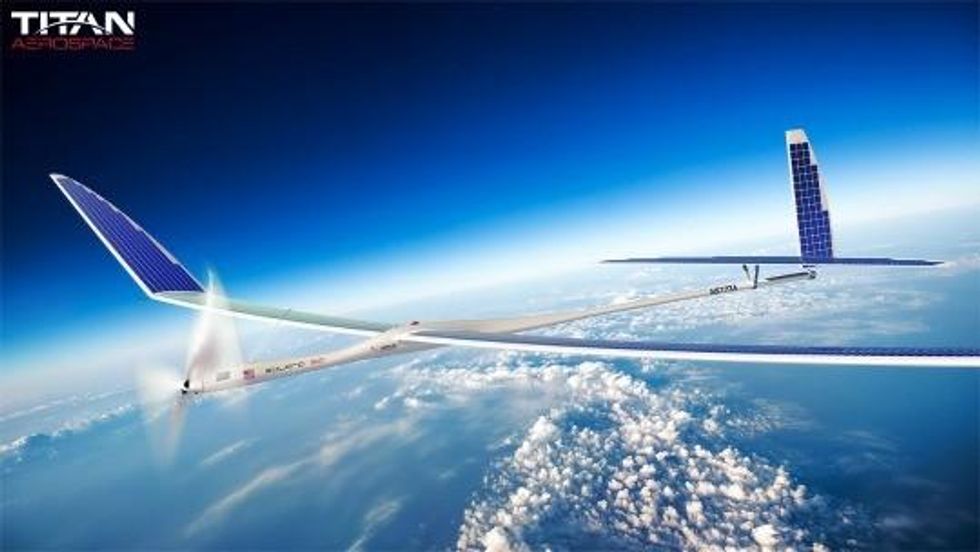

SUBSCRIBE TO OUR FREE NEWSLETTER
Daily news & progressive opinion—funded by the people, not the corporations—delivered straight to your inbox.
5
#000000
#FFFFFF
To donate by check, phone, or other method, see our More Ways to Give page.


Daily news & progressive opinion—funded by the people, not the corporations—delivered straight to your inbox.

Internet giant Facebook is reportedly in talks to buy Titan Aerospace, a manufacturer of solar-powered drones that can stay airborne for five years at a time.
The acquisition of the New Mexico-based company would reportedly be part of the Internet.org initiative, of which Facebook is a founding partner, whose goal is to bring Internet access to parts of the world currently not connected to the web.
TechCrunch, first to report on the potential $60 million-acquisition, wrote that the company would start by building 11,000 of Titan's Solara 60 "atmospheric satellite" model of solar drones, which would provide a a less expensive alternative to an orbital satellite.
On its website, Titan states that these "atmospheric satellite" are in the development phase.
Titan unveiled its Solara 50 and 60 prototypes in August at the AUVSI Unmanned Systems 2013 conference.
TechCrunch also pointed out this video uploaded by TomoNews, which explains some of the specs on these solar drones:
Titan Aerospace unveils the world's first solar-powered UAVsOriginally published on August 26, 2013 Aircraft designer Titan Aerospace unveiled last week its Solara 50 and 60 unmanned ...
Another web giant, Google, has its own, similar project in the works. Instead of drones, its "Project Loon" would use a network of floating balloons to provide Internet access. Google is continuing testing on its Loon project in California.
Dear Common Dreams reader, The U.S. is on a fast track to authoritarianism like nothing I've ever seen. Meanwhile, corporate news outlets are utterly capitulating to Trump, twisting their coverage to avoid drawing his ire while lining up to stuff cash in his pockets. That's why I believe that Common Dreams is doing the best and most consequential reporting that we've ever done. Our small but mighty team is a progressive reporting powerhouse, covering the news every day that the corporate media never will. Our mission has always been simple: To inform. To inspire. And to ignite change for the common good. Now here's the key piece that I want all our readers to understand: None of this would be possible without your financial support. That's not just some fundraising cliche. It's the absolute and literal truth. We don't accept corporate advertising and never will. We don't have a paywall because we don't think people should be blocked from critical news based on their ability to pay. Everything we do is funded by the donations of readers like you. Will you donate now to help power the nonprofit, independent reporting of Common Dreams? Thank you for being a vital member of our community. Together, we can keep independent journalism alive when it’s needed most. - Craig Brown, Co-founder |

Internet giant Facebook is reportedly in talks to buy Titan Aerospace, a manufacturer of solar-powered drones that can stay airborne for five years at a time.
The acquisition of the New Mexico-based company would reportedly be part of the Internet.org initiative, of which Facebook is a founding partner, whose goal is to bring Internet access to parts of the world currently not connected to the web.
TechCrunch, first to report on the potential $60 million-acquisition, wrote that the company would start by building 11,000 of Titan's Solara 60 "atmospheric satellite" model of solar drones, which would provide a a less expensive alternative to an orbital satellite.
On its website, Titan states that these "atmospheric satellite" are in the development phase.
Titan unveiled its Solara 50 and 60 prototypes in August at the AUVSI Unmanned Systems 2013 conference.
TechCrunch also pointed out this video uploaded by TomoNews, which explains some of the specs on these solar drones:
Titan Aerospace unveils the world's first solar-powered UAVsOriginally published on August 26, 2013 Aircraft designer Titan Aerospace unveiled last week its Solara 50 and 60 unmanned ...
Another web giant, Google, has its own, similar project in the works. Instead of drones, its "Project Loon" would use a network of floating balloons to provide Internet access. Google is continuing testing on its Loon project in California.

Internet giant Facebook is reportedly in talks to buy Titan Aerospace, a manufacturer of solar-powered drones that can stay airborne for five years at a time.
The acquisition of the New Mexico-based company would reportedly be part of the Internet.org initiative, of which Facebook is a founding partner, whose goal is to bring Internet access to parts of the world currently not connected to the web.
TechCrunch, first to report on the potential $60 million-acquisition, wrote that the company would start by building 11,000 of Titan's Solara 60 "atmospheric satellite" model of solar drones, which would provide a a less expensive alternative to an orbital satellite.
On its website, Titan states that these "atmospheric satellite" are in the development phase.
Titan unveiled its Solara 50 and 60 prototypes in August at the AUVSI Unmanned Systems 2013 conference.
TechCrunch also pointed out this video uploaded by TomoNews, which explains some of the specs on these solar drones:
Titan Aerospace unveils the world's first solar-powered UAVsOriginally published on August 26, 2013 Aircraft designer Titan Aerospace unveiled last week its Solara 50 and 60 unmanned ...
Another web giant, Google, has its own, similar project in the works. Instead of drones, its "Project Loon" would use a network of floating balloons to provide Internet access. Google is continuing testing on its Loon project in California.